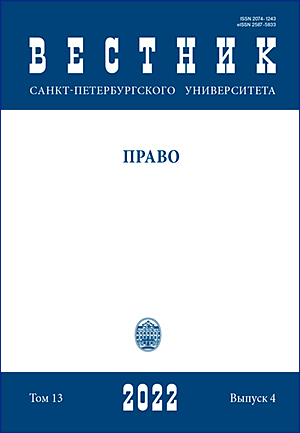Constitutional bases of legislative and supplementary legal regulation in the Republic of Kazakhstan: Practical issues and doctrinal interpretation
DOI:
https://doi.org/10.21638/spbu14.2022.412Abstract
The article examines the issues of differentiation of legislative and subordinate regulation of public relations. It is noted that in the process of law-making activities, including the legislative process, practical questions often arise about the competence of various state bodies to establish various legal norms and rules. These issues are related to the need to establish a clear legal meaning of the constitutional norms devoted to the definition of the subject of regulation of laws. In particular, there is a need to clarify the provisions of paragraph 3 of Art. 61 of the Constitution of the Republic of Kazakhstan in terms of the concepts “the most important public relations”, “all other relations”, “subsidiary legislation”, as well as to establish the relationship between these concepts. Interpretation is also required by the provisions of paragraph 4 of Art. 61 of the Constitution of the Republic of Kazakhstan in terms of clarifying the question of whether the conclusion follows from mentioned provisions that all possible social relations in the Republic of Kazakhstan are subject to legal regulation, including those that are subject to other social and technical regulators (morality, national, business and professional traditions and customs, religion, standards, technical regulations, etc.). Answering the questions raised, the author emphasizes that the law and bylaws, as a rule, constitute a single system of legislation, performing the functions of primary and secondary acts. However, the secondary nature of subsidiary legislation does not mean that they regulate “unimportant” public relations. The law is essentially aimed at regulating all important social relations.
Keywords:
constitution, law, subsidiary legislation, legislative regulation, supplementary legal regulation, uncertainty of constitutional norms, interpretation of constitutional norms, parliament, law-making process
Downloads
References
Downloads
Published
How to Cite
Issue
Section
License
Articles of "Vestnik of Saint Petersburg University. Law" are open access distributed under the terms of the License Agreement with Saint Petersburg State University, which permits to the authors unrestricted distribution and self-archiving free of charge.






